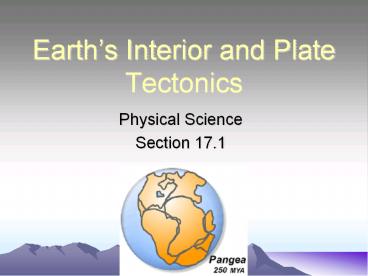Earth PowerPoint PPT Presentation
1 / 24
Title: Earth
1
Earths Interior and Plate Tectonics
- Physical Science
- Section 17.1
2
This is how the continents formed.
- http//www.youtube.com/watch?vTzzGPfVx32MlistPL
ABDC7B24FAFE33FD
3
The Earth is like a parfait, it has layers
- If you cut the earth in half, it would look very
much like a parfait, with different layers and
compositions based on density - The earth has three main layers, the crust, the
mantle, and the core
4
The Crust
- We live on this layer
- Its is cool, and made of solid rock
- Oceanic crust is thinner and denser than
continental crust. - The crust is the least dense portion of the earth
and only about 12-25 miles thick
5
The Mantle
- Layer of rock that is denser than the crust
- About 1800 miles thick
- Outer mantle is solid rock
- Inner mantle the rocks are extremely hot and
bendable like gum (plastic)
6
The Core
- The center of the earth
- Made mostly of iron and nickel
- The inner core is solid metal while the outer
core is liquid metal
7
The Earth heats up with depth
- At only 2 miles down the temperature increase to
120 F - The core is much hotter than the mantle
- In the core, temperatures reach over 10,000 F
8
The earth heats up with depth
- The earth gets warmer towards the core because it
contains so many radioactive isotopes - These unstable isotopes are constantly breaking
down, releasing huge amounts of energy, which in
turn heat the earth
9
How do plates move?
http//www.youtube.com/watch?vryrXAGY1dmE
10
Evidence 1 The Pangea Puzzle
- In the 20th century, Alfred Wegener noticed that
eastern S.America fits into western Africa - He also noticed that several of the other
continents fit together like puzzle pieces - He also found that fossil evidence showed that
several of the same organisms are found on
continents now separated by oceans - He theorized that 250 million years ago all the
continents combined to form the giant land mass
he named pangea
11
How did this happen?
- The earths outer shell, called the lithosphere
is made of the crust and upper portion of the
mantle. - This lithosphere is very rigid and consists of 7
large pieces and a few small ones that fit
together like a puzzle - These large pieces are called tectonic plates
12
Plate Tectonics
- These plates fit together like puzzle pieces and
move in relation to each other - these plates move away, towards, or alongside
each other - Tectonic plates move about 6 inches per year
13
Divergent ? ? Plate Boundaries
- In some areas, the plates move away from each
other - When this occurs, hot liquid rock called magma
rises and cools, forming new lithospheric rock
14
Convergent ? ?Plate Boundaries
- Less dense continental plate floats over more
dense oceanic plate - This process is called subduction
- As this more dense rock goes down into the
mantle, it heats up and melts - The magma rises and pushes up the crust, forming
volcanic mountains also earthquakes
15
- Subduction - two plates meet, the more dense
plate (oceanic crust), dives beneath the less
dense plate (continental crust)
16
Continental vs. Continetal
- Same density so no subduction
- Builds non-volcanic mts.
- Earthquakes
17
Oceanic vs. Oceanic
- Similar density, but subduction anyway
- Earthquakes, trenches,
- volcanic island arcs
18
Transform Fault Boundaries
- These are areas where plates move along side one
another - As plates move, they can cause cracks in the
lithosphere called faults - As plates move along side each other at these
faults, the plates cause a great deal of force
and create earthquakes
19
RECAP ?
- Divergent ? ? Plate Boundaries
- Divergent means plates MOVE AWAY? ? from each
other - Convergent ? ? Plate Boundaries
- Convergent means plates MOVE TOWARD ? ? each
other - Transform Fault Boundaries
- areas where plates move along side one another
- like this ? or this ?
- ? ?
20
- Earth is made of 3 main layers
- Crust- cool, thin, made of rock, 10-25 miles
thick - Mantle, denser than crust, 2500 miles thick, 80
of earths volume inner mantle solid rock, outer
mantle bendable gummy rock - Core- center of earth, made of iron and nickel,
made of 2 layers inner solid metal, outer liquid
metal
21
- Pangea- 250 million years ago all the continents
combined to form the giant land mass called
Pangea - Lithosphere (earths outer shell) is made of the
crust and upper portion of the mantle. - lithosphere -very rigid and consists of 7 large
pieces (called tectonic plates) and a few small
ones that fit together like a puzzle
22
- Plate Tectonics
- These plates fit together like puzzle pieces and
move in relation to each other - these plates move away, towards, or alongside
each other - Tectonic plates move 6 inches per year
23
Evidence 2 Biogeographical
24
Final views
- http//www.youtube.com/watch?vQrQDXnnXOo4feature
player_embedded!

